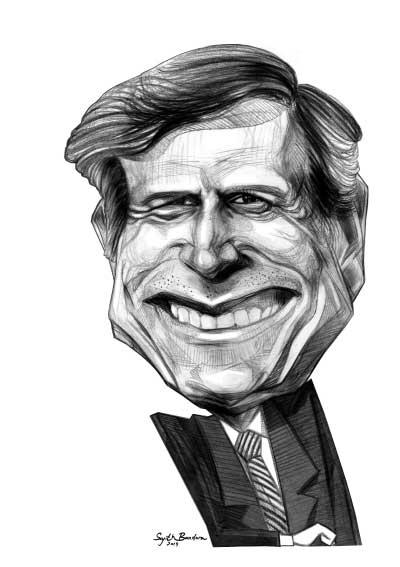’’America should not ask the countries to choose between China and the U.S.’’
Posted on May 19th, 2019
By Kelum Bandara Courtesy Daily Mirror

Former Ambassador of the United Sates (US) to Sri Lanka Robert O. Blake, in an interview with Daily Mirror, shares his views on the Indo-Pacific strategy, the importance of Sri Lanka’s strategic positioning in the region and its benefits to the country as a whole. He served as the Ambassador to Sri Lanka between 2006 and 2009 when the country witnessed the height of the war. From 2009 to 2013, he served as Assistant Secretary of State for South and Central Asia. He currently works as Senior Director (India and South Asia) of McLarty Associates based in Washington D.C. He was here recently at the invitation of Pathfinder Foundation and Joint Apparel Association Forum of Sri Lanka and delivered a lecture titled ‘Update from Washington: US Foreign Policy towards China and South Asia and what it means for Sri Lanka’. The excerpts of the interview:
- You had a similar group during the war led by Gotabaya Rajapaksa of an inter-agency group of all intelligence, law enforcement and military personnel
- America should not ask the countries to choose between China and the U.S.
- The government needs to depoliticize investigations as much as possible·
- Indonesia set up a special counter-terrorism unit called Densus 88 that has been very successful
Q How do you sum up your programme here in Sri Lanka?
I am here to do a little bit of business. Once that was scheduled, I
received an invitation to speak from Milinda Moragoda of the Pathfinder
Foundation. It is an important time for Sri Lanka.
Q These days, foreigners stay away from Sri Lanka. But, you are an exception.
As I said, I had a business commitment for a client. As you know, I was
the Ambassador for Sri Lanka during the civil war- from 2006 to 2009. So
I am accustomed to a bit of risk. I also think that, from all I have
been told, the security forces have done a good job of rounding up a lot
of the suspects.
Sri Lanka is very well positioned. The United States, China, India, Japan, Australia and others are all interested in Sri Lanka because it has an important strategic location on the major sea lanes; it has an open market economy, and a democracy.
Q Now
coming to the topic, I would like to ask about the Indo-Pacific
strategy of the United States. Sri Lanka is well positioned in the
region. How do you view Sri Lanka’s importance?
As I said in my speech, Sri Lanka is very well positioned. The United
States, China, India, Japan, Australia and others are all interested in
Sri Lanka because it has an important strategic location on the major
sea lanes; it has an open market economy, and a democracy. It is
important for Sri Lanka to take a few steps now after these bombings.
First, of course, they have to pursue investigations with vigour. They
need to do it in an even handed way so they treat everybody with respect
and dignity. Secondly, they need to work with the religious
authorities, to promote reconciliation both within the Muslim community
and also between the Muslims and Christians.
The government needs to de-politicize investigations as much as possible. I heard from a lot of Sri Lankan friends during the last few days that they are very worried about the lack of cooperation between the Prime Minister and the President. And as you saw in my speech, we had similar problems in the United States before 9/11. Our intelligence agencies and our law enforcement authorities were not coordinating with each other. We set up a special group led by the White House. It included the senior officials of all the intelligence agencies and all the law enforcement agencies. Their task was to evaluate every piece of intelligence, and for those that were credible, they assigned somebody very specific to follow up on each threat. As a result of that, we have not had a major foreign terrorist attack on US soil since 9/11. I think Sri Lanka would benefit from forming a similar group to deal with this new threat by the ISIS and some Muslim groups.

You had a similar group during the war. I remember Gotabaya Rajapaksa led an interagency group of all intelligence, law enforcement and military personnel. Every single week, they gathered all the intelligence together and looked at the threats. But to be clear, I am referring only to the institutional arrangements at that time. It is very important to fully respect human rights and not repeat the excesses of the past, such as the white van disappearances. I expressed the US Government’s strong concern about those and other human rights abuses while I was the Ambassador.
Q
Order in this region is important even for the countries like the
United States. What kind of assistance can the US give us in combating
this terrorism for overall peace in the region?
I think we are already extending assistance. As you know, our Federal
Bureau of Investigations has sent people here to help with the
investigations. We can work together with your intelligence agencies to
share information about possible threats and to integrate Sri Lanka
better into global information sharing networks.
Q
When you were the Ambassador in Sri Lanka, you witnessed LTTE
terrorism. Now you see a new kind of terrorism here. How do you compare
and contrast the two?
I think they have different objectives. The LTTE wanted to use terrorism
as a way of promoting a separate state and also to stop the army from
moving to the north. As the army moved to the north, the LTTE increased
attacks in Colombo. It had a political objective. In the case of ISIS,
they have two objectives. First, after they lost their so-called
Caliphate in Iraq and Syria, they need to prove that they are still a
relevant, strong organization. So, they are looking around for
opportunities all over the world – in Afghanistan, Philippines, Sri
Lanka etc- to prove that they still have the capability to mount serious
attacks. Secondly, they are looking for places where they can try to
sow divisions between the Muslims and Christians for them to exploit to
then organize in that country.
Traditionally, relations between Muslims and Christians have been good in Sri Lanka. May be, they calculated that people will not be paying much attention because of that. Now, it is very important for the government and the religious communities to make sure that there are no hostilities between the Christian and Muslim communities for ISIS to exploit.
Q According to your own experience and observations, how long will it take for Sri Lanka to recover from this crisis?
As far as the law enforcement is concerned, you have to continuously
work with friends like India, the United States and others to prevent
these kinds of attacks in the future. The economic impact could last six
to twelve months, once can reassure the international community that
you have mechanisms in place to detect and prevent future attacks inside
the country. Indonesia, for example, set up a special counter-terrorism
unit called Densus 88 that has been very successful in apprehending
terrorists and preventing attacks. As a result, tourism is booming
there.
Q Did you see signs of radicalization of Sri Lankan Muslims when you were here?
There were certainly pockets in eastern Sri Lanka where people were
worried about growing Wahabi influence. But, I cannot say that people in
2009 were focused on possible Al-qaeda or ISIS threats. ISIS is a more
recent phenomenon. When I was here, the focus was rightly on the LTTE.
The economic impact could last six to twelve months. As far as the law enforcement is concerned, you have to continuously work with friends like India, the United States and others to prevent these kinds of attacks in the future
Q
Again, back to the topic, Sri Lanka finds it difficult to reconcile its
relations with the world powers including the United States, India,
China etc because each of these countries have different interests. What
is your advice to Sri Lanka?
First, my advice to America is that it should not ask the countries to
choose between China and the U.S. They do not want to choose. They want
to have good relations with the US, China, India and others. To develop
better business opportunities with these countries, you have to improve
the ease of doing business as much as possible. You have to heal
divisions that have been created in your society. You also must educate
your people to confront the challenges that would be posed by
automation, Artificial Intelligence (AI) and new technologies that will
profoundly affect all our countries.

A good strategy is to establish educational partnerships with universities from the US and elsewhere. You should then encourage companies like Google, Apple and others to invest in these universities. This can enable cutting edge training and research that can help propel your economy.
Your apparel companies are a model in this respect. They have been able to maintain their competitive edge for a long time. They do so by continuously upgrading their capabilities, cutting costs and using advice from companies like Accenture who advice companies how to automate, use machine learning and other tools to stay competitive.
Q A lot of western scholars talk about growing Chinese presence. What is your comment?
China has leveraged the Belt and Road Initiative to expand its influence in the Indian Ocean region. The US is responding.
It is establishing a new institution called the ‘International Development Finance Cooperation (IDFC). It will have US $ 60 billion of funding to help the American companies all over the Indo-Pacific region. I think we also need to do more to expand our high level diplomatic engagements. President Donald Trump needs to come to the region more. Our ministers need to come to the region more. We need to do everything possible to help our companies.
But we have our own advantages. We have the soft power of our foundations, our non-governmental organizations, and our universities, all of whom bring the power of our ideas and substantial resources of their own. Another great US asset is the investment brought by American companies. People forget that the US is by far the largest private investor in Asia Pacific, not China.
Q
Assistance from the western countries including the US is linked to
political commitments. It is not the case when it comes to China. They
don’t interfere with internal politics. So, they have the advantage over
other countries. How do you respond?
Most of the problems of war are now behind you. There still needs to be
more efforts given to reconciliation between the Tamils and the
Sinhalese, and to priorities like reparations. At the same time, the
Easter Sunday attacks have opened up new divisions in Sri Lanka between
Christians and Muslims. That marks an additional priority for
reconciliation. But no one is suggesting our assistance be conditioned.
Four days after the attack, the Millennium Challenge Cooperation (MCC)
approved a new programme for Sri Lanka. That was a concrete signal of US
support.
Q But, Sri Lanka needs to do some reforms to qualify for it…
The MCC is a good governance programme. To be eligible, countries must
ensure good governance, stop corruption, and maintain strong independent
institutions. The purpose of the programme is to encourage good
governance. It is a positive reinforcement.
Q How do you recommend Sri Lanka as an investment destination?
I think Sri Lanka needs to do more to improve its investment climate. If
you look at the World Bank’s Index of Ease of Doing Business, Sri Lanka
ranks 100 out of 190. And, that is not good enough. Yours is a
relatively small economy. If you want to attract the leading edge
investments, you need to make sure that you are among the most open
economies in the world. For example, Singapore has a tiny population.
But, they have huge investments. Why? They are the number one country in
Ease of Doing Business. It is easy to set up a business. They have a
very good, independent judiciary. There are no excessive regulations.
Q How do you compare Sri Lanka with other countries like India, Bangladesh, Thailand, and Vietnam in the region?
If you look at this independent index, Sri Lanka is behind all of them.
Sri Lanka is 23 points behind India. Sri Lanka is well behind Vietnam.
So your country has a lot to do. Now, with bombings people are going to
be more cautious about investing here. Now your country has to come
together not only to heal these divisions but also think how to make the
economy open as much as possible. Then, you can benefit from investment
from all of these countries- the United States, China, India etc. There
is a huge opportunity for your country.
Q The US is among the countries that welcomed the change in 2015. What do you feel today?
I am very happy. Relations between Sri Lanka and the United States have
come an enormous distance. Our exports have increased by 40 per cent. We
remain your largest market for exports. We have good military to
military relations. There is a lot of positive momentum now. I am very
encouraged now.